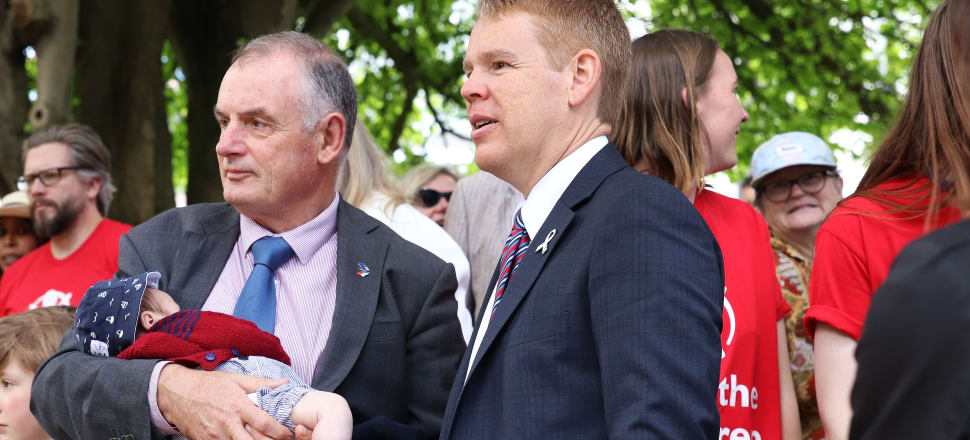
Jacinda Ardern described it as a minor reshuffle - it is anything but for the retiring and demoted MPs who triggered it, writes political editor Jo Moir.
Kris Faafoi is one of Parliament’s most-loved MPs.
His colleagues from both sides of the House rushed to pay tribute to him on Monday, acknowledging his genuine decision to quit politics and instead focus on his young family.
One of his best strengths as a minister, and one who has been given one of the biggest workloads in Cabinet, is that he doesn’t have an ego, nor has he ever displayed any leadership ambitions.
He’s simply loved politics and wanted to get on with the job.
Faafoi has lived and breathed politics, first as a press gallery reporter and then as an MP, and because of that he has good political and news judgment.
That judgement served him well when he went to the Prime Minister ahead of the 2020 election and said his heart wasn’t in it any longer.
But safe pairs of hands were few and far between in Labour’s caucus at the time so Ardern asked him to stay.
Faafoi gave his all to Labour and the party has done a disservice by making him stay longer than he wanted to.
His usually sound judgment escaped him when he said yes to Ardern, and took on significant reform in the justice sector, a reset of the country’s immigration policy and the merger of state-owned RNZ and TVNZ.
“I don’t think you should take on a Cabinet position if you’re going to be half-pie about it,’’ Faafoi told Newsroom on Monday following the announcement.
He went on to say that the past 18 months have been busy and while he loves Parliament and it’s a great opportunity, “I also love my family’’.
Whether Faafoi intended to be half-pie in the last 18 months or not, there’s no doubt that having to delay his decision to put his family ahead of politics has had an impact on his approach in the months since.
In 2020 Faafoi was widely referred to as a “rising star’’ and tipped to go on to do great things.
But an unreasonable workload coupled with a job he only agreed to at the request of a respected friend and leader, has led to criticisms of him not being across his portfolios, a refusal to front questions on some of the big issues, and a tendency to kick the can down the road.
Faafoi gave his all to Labour and the party has done a disservice by making him stay longer than he wanted to.
On the flip side, Trevor Mallard’s decision to leave Parliament after 35 years is the right one and won’t have been met with any protest from his party’s leadership.
Mallard has dedicated more than three decades to public service and for that he should be acknowledged.
But in the past couple of years Mallard has clearly lost his passion for politics and at times almost seemed to resent being at Parliament as his temperament got the better of him on multiple occasions.
The calls for him to go have become louder and more frequent while those in Labour springing to his defence have thinned out.
Even Ardern has started answering the question of whether Mallard is doing a good job with a completely unrelated response of, “he’s doing a hard job’’.
The three-week occupation of Parliament took a toll on Mallard and no doubt sped up the transition out of Parliament that he had told Ardern he planned to do over the course of this term.
He’s taken the time to prepare his deputy, Adrian Rurawhe, for the role and given him opportunities to chair Question Time and build up his confidence.
Mallard leaves the Speaker role in safe hands.
The other big departure of Ardern’s arguably major Cabinet reshuffle on Monday is Police Minister Poto Williams.
While Williams stays on in Cabinet, she loses all her portfolios and instead has been handed the fairly light workload of conservation and disability issues.
It was inevitable that a senior minister such as Chris Hipkins or Megan Woods would pick up the role with so much public and political focus on increasing gang violence and firearm shootings.
Putting a new or less experienced minister in that seat would have run the risk of the pressure mounting before they’d got their head around the portfolio and led to a knock in confidence they might not have come back from.
Hipkins’ parachuting into the job could only happen if he was relieved of some of his other portfolios - Ayesha Verrall has taken Covid, and Jan Tinetti picks up much of his education work.
Ardern has also signalled there will be another wider reshuffle ahead of the election next year at which point she will have had more time to reassess the police portfolio and might look to give someone else a go.
Ardern denies she had poor judgment in appointing the inexperienced Williams to police minister in the first place and has instead categorised it as being a shift in focus in the portfolio that has prompted her demotion.
Williams has been flailing in the role for months and it’s become increasingly clear the Opposition had her in their sights.
The only saving grace for Williams is that her demotion is part of a huge number of changes, which conveniently takes some of the spotlight off her less than impressive performance.







